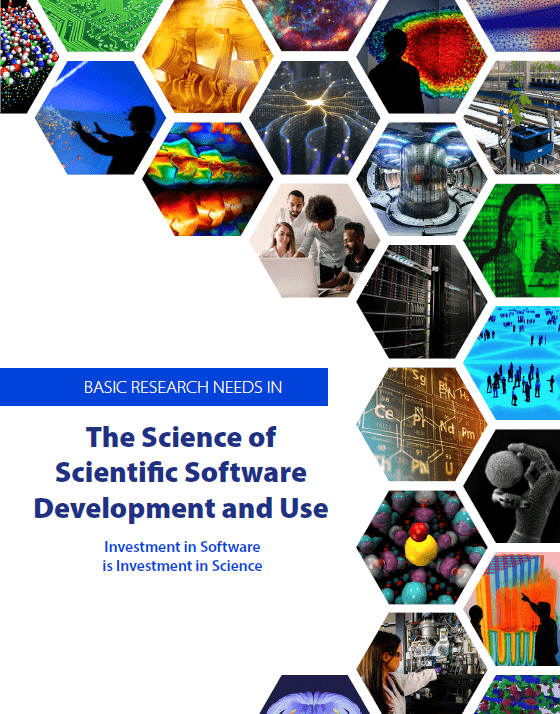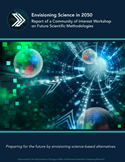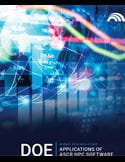ASCR Program Documents
Provided below is a listing of relevant articles, plans and ASCR-sponsored workshop reports. Select this link to view the ASCR Program Documents Archive.
Additional reports from ASCR's Federal Advisory Committee are available from the ASCAC report page.
Basic Research Needs For Energy Efficient Computing For Science
Energy-efficient computing is vital to the continued advancement of scientific research and the realizable development of cutting-edge computing technologies. As we advance beyond the exascale era, improving energy efficiency is expected to increasingly unlock new capabilities and an expanded set of use cases for new computing technologies. The Workshop on Energy-Efficient Computing for Science, organized by the DOE’s ASCR program, identified research opportunities and grand challenges for this topic. The workshop identified five priority research directions that promise to drive significant progress toward energy-efficient computing. Collectively, solutions to these PRDs will ensure that scientific advancements can be sustained
Basic Research Needs for Inverse Methods for Complex Systems under Uncertainty
The ASCR basic research needs workshop for Inverse Methods for Complex System under Uncertainty was held in June 2025. The four priority research directions (PRDs) identified by the participants address the critical challenges toward inferring unknown properties of a system using experimental and observational data. The PRDs are: discovering, exploiting, and preserving physical and problem structure; overcoming model limitations; integrating disparate, multimodal, and/or dynamic data; and tailoring the solution of inverse problems to downstream tasks. Their interconnected nature highlights the importance of a holistic approach to achieve transformative solutions.
Basic Research Needs in the Science of Scientific Software Development and Use
In December 2021, ASCR convened a workshop on basic research needs for the Science of Scientific Software Development and Use (SSSDU). Workshop participants identified three priority research directions (PRDs) and three important crosscutting themes that center on the following overarching insight: software has become an essential part of modern science that impacts new discovery, policy, and technological development. To have full confidence in science delivered via software, we must improve the processes and tools that help us create and use it, and this enhancement requires a deep understanding of the diverse array of teams and individuals doing the work.

Report for the ASCR Workshop on Basic Research Needs in Quantum Computing and Networking
In July 2023, DOE’s Advanced Scientific Computing Research (ASCR) program in the Office of Science convened the Workshop on Basic Research Needs in Quantum Computing and Networking. Employing quantum mechanical resources in computing, information processing, and networking opens the door to potential exponential advantages over classical counterparts. However, quantifying and realizing such advantages poses extensive scientific and engineering challenges. Department of Energy (DOE) investments have driven steady progress in addressing such challenges. Recently developed quantum algorithms offer asymptotic exponential advantages in speed or accuracy for fundamental scientific problems. These problems include simulating physical systems, solving systems of linear equations, differential equations, and optimization problems. The following five priority research directions (PRDs) were identified as a result of the workshop: end-to-end software tool chains to program and control quantum systems and networks at scale; efficient algorithms delivering quantum advantages; bench marking, verification, and simulation methods to assess quantum advantages; resilience through error detection, prevention, protection, mitigation, and correction; and hardware and protocols for next-generation quantum networks.
 Integrated Research Infrastructure Architecture Blueprint Activity: Final Report
Integrated Research Infrastructure Architecture Blueprint Activity: Final Report
In 2022, The Office of Science (SC) leadership directed the Advanced Scientific Computing Research (ASCR) program to conduct the Integrated Research Infrastructure Architecture Blueprint Activity (IRI ABA) to produce a reference framework to inform a coordinated, SC-wide strategy for IRI. This activity convened the SC science programs and over 150 DOE national laboratory experts from all 28 SC user facilities across 13 national laboratories to consider the technological, policy, and sociological challenges to implementing IRI. Through a series of cross-cutting sprint exercises facilitated by the IRI ABA Leadership Group and peer facilitators, participants produced an IRI Framework based on the IRI Vision (see callout below) comprising IRI Science Patterns spanning DOE science domains, IRI Practice Areas needed for implementation, IRI blueprints that connect Patterns and Practice Areas, and overarching principles for realizing the DOE-wide IRI ecosystem. The resulting IRI framework and blueprints provide the conceptual foundations to move forward with organized, coordinated DOE implementation efforts.
July 2023: Report

Basic Research Needs for Visualization for Scientific Discovery, Decision-Making, and Communication
Department of Energy’s (DOE) Office of Advanced Scientific Computing Research (ASCR) sponsored a Basic Research Needs workshop in January 2022 to understand the major opportunities and grand challenges in visualization tools and technologies for scientific computing, with a special focus on DOE-relevant applications and goals. The workshop identified five priority research directions (PRDs) for visualization to support scientific discovery, decision-making, and communication.
Envisioning Science in 2050
To explore future-focused questions that could impact the future of DOE, a Community of Interest (COI) on Future Scientific Methodologies, sponsored by the Office of Advanced Scientific Computing Research (ASCR), was held over three non-consecutive days in November 2020. The COI’s charge was to create a vision for how future computational fabrics might shape, and be shaped by, scientific and technological advances over the next 10 to 30 years.
Market Research Study: Applications of ASCR HPC Software
The ASCR program has developed hundreds of software tools for high performance computing (HPC). DOE is interested in making its HPC software portfolio available to the public in order to maximize the value of what has been developed. This document, organized by the name of the ASCR-funded software, provides illustrations of how a sample of these tools have been used to advance industry applications. This report was funded by DOE through a contract for Phase 0 Outreach and Assistance for the Small Business Innovation Research/Small Business Technology Transfer Programs Office.
Computer Science Research Needs for Parallel Discrete Event Simulation (PDES)
In September 2021, ASCR convened a roundtable to discuss computer-science research needs for Parallel Discrete Event Simulation (PDES). This report presents a sample of important applications with their inherent discrete event technology elements. Needs are outlined in core areas of parallel discrete event research as well as cross-cutting directions in computer-science research that positively impact scientific advancements across several important application areas. Priority research opportunities in advanced computing for PDES are identified.

Foundational Science for Biopreparedness and Response
This report is based on an SC Roundtable on Foundational Science for Biopreparedness and Response, which was held in March 2022 and included attendees from DOE’s national laboratories, industry, and other governmental agencies. The roundtable focused on understanding DOE’s unique role in addressing future biological crises, bringing together capabilities in the physical, computational, and biological sciences. Participants identified five priority research opportunities (PROs) and the specialized cross-cutting capabilities needed to support biopreparedness studies at DOE national user facilities. The identified PROs are inherently multidisciplinary, requiring coordination across ASCR, BER, and BES, and defined underlying science and technology advances needed for ensuring the nation’s future preparedness and response to biological crises.
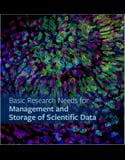
Basic Research Needs for Management and Storage of Scientific Data
In January 2022, ASCR convened a workshop to identify priority research directions in the area of data management for high-performance and scientific computing. Attendees were challenged to identify promising approaches that would support the breadth of the DOE mission, including the explosion of artificial intelligence (AI) uses and the growing needs of experimental and observational science. Technological and science drivers were identified and considered as they relate to key aspects of data management such as interfaces, architectural design, and FAIR principles (Findable, Accessible, Interoperable, and Reusable).
January 2022: Brochure, Report

Office of Science User Facilities: Lessons from the COVID Era and Visions for the Future
In December 2020, the U.S. Department of Energy Office of Science convened a virtual Roundtable of its scientific user facilities to discuss facility challenges and lessons learned during the COVID-19 pandemic as well as facility responses, best practices, and innovations that could be adopted going forward. Roundtable participants included facility staff, users, and user executive committee chairs. This report summarizes their discussions, which encompassed topics such as user research and facility operations in virtual and physically distanced contexts; user training and engagement; computation, data, and network resources; and crosscutting issues.
July 2021: Report
Data Reduction for Science: Brochure from the Advanced Scientific Computing Workshop
In January 2021, DOE’s Advanced Scientific Computing Research program office held a virtual workshop to identify priority research directions leading to enhanced capabilities in data reduction. This workshop examined many scientific drivers, such as radio astronomy, fusion, combustion, climate, light sources, nuclear physics, and genomics, which are in desperate need for new Research & Development in data reduction, because they currently risk ad hoc decisions that can limit the amount of knowledge gathered from Office of Science facilities. The workshop identified four priority research directions.
April 2021: Brochure
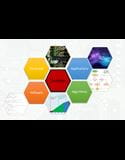
Basic Research Needs for Reimagining Codesign for Advanced Scientific Computing
In March 2021, DOE’s Advanced Scientific Computing Research convened the Workshop on Reimagining Codesign. Codesign in High Performance Computing and Artificial Intelligence has been critical to the design and implementation of contemporary computer architectures. The process of codesign must be reimagined to be continuous, agile, and secure to reflect the new reality of rapid change in both workloads and architectures. The workshop was organized around discussions on eight topic areas, and from these, four priority research directions were identified.
Toward a Seamless Integration of Computing, Experimental, and Observational Science Facilities: A Blueprint to Accelerate Discovery
The Department of Energy, Office of Science operates world-leading facilities for experimental, observational, and computational science. A transformation of science is underway, with workloads at supercomputing facilities increasingly driven by this explosion of data from instruments and experimental facilities, as well as the accelerating use of Artificial Intelligence (AI) as a tool for scientific discovery. A seamless integration of computing, networking, instruments, and experimental facilities is required to support these emerging workloads and open up a new frontier of U.S. leadership in scientific discovery.
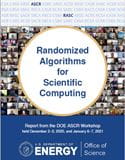
Randomized Algorithms for Scientific Computing
This report summarizes the outcomes of the ASCR workshop on "Randomized Algorithms for Scientific Computing (RASC)" held virtually across four days in December 2020 and January 2021. Randomized algorithms have enabled significant advances in artificial intelligence (AI) and represent a foundational research area in advancing AI for Science. Future advancements in DOE Office of Science priority areas such as climate science, advanced materials, combustion, and quantum computing all require randomized algorithms for surmounting challenges of computational complexity, robustness, and scalability.
December 2020 and January 2021: Report
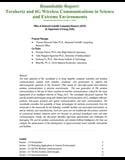
Roundtable Report: Terahertz and 6G Wireless Communications in Science and Extreme Environments
The main objective of the roundtable is to explore the potential of Terahertz (THz) and 6G communications in extreme environments such as industrial, manufacturing, and large critical scientific facilities (for example, light sources, accelerators, high-performance computers, data centers, neutron sources, etc.). In contrast to commercial wireless networks (5G included), which are optimized for best-effort broadband voice and Internet of Things (IoT) services.
October 2020: Report

From Long-distance Entanglement to Building a Nationwide Quantum Internet: Report of the DOE Quantum Internet Blueprint Workshop
Today, many scientific experts recognize that building and scaling quantum-protected and enhanced communication networks are among the most important technological frontiers of the 21st century. The international research community perceives the construction of a first prototype global quantum network—the Quantum Internet—to be within reach over the next decade.
In February 2020, the U.S Department of Energy (DOE)’s Office of Advanced Scientific Computing Research hosted the Quantum Internet Blueprint workshop to define a potential roadmap toward building the first nationwide quantum Internet. The workshop participants included representatives from DOE national laboratories, universities, industry, and other U.S. agencies with serious interests in quantum networking. The goal was to provide an outline of the essential research needed, detail any engineering and design barriers, and suggest a path forward to move from today’s limited local network experiments to a viable, secure quantum Internet.
July 2020: Report
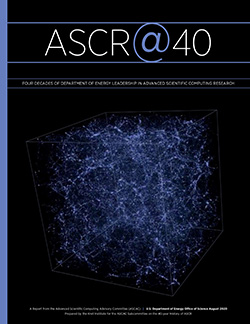
ASCR@40: Four Decades of Department Of Energy Leadership in Advanced Scientific Computing Research
In December 2017, the Advisory Committee for DOE’s Office of Advanced Scientific Computing Research (ASCR) was asked to document some of the major impacts of ASCR and its predecessor organizations. This seemingly simple request kicked off a multi-year process of information gathering, distilling, curating, and refining. Input was provided by over 100 scientists.
June 2020: Report
Individual Story Summaries: Petaflops for the People | Building the Computational Workforce | Supporting Science through Open-Source Software | World-Leading Computing Facilities | Building Better Computers | Overcoming Scaling Challenges | Making Sense of Big Data | Grid Computing For High-Speed Collaboration | Moving Big Data | Uncertainty Quantification | Applying Equations to Complex Problems | Modeling and Simulation

5G Enabled Energy Innovation: Advanced Wireless Networks for Science (Workshop Report)
On March 10-12, 2020, the Office of Science (SC) organized a three-day workshop to deliver a community-based report highlighting 5G and beyond basic research, development, applications, technology transition, infrastructure, and demonstration opportunities in support of the U.S. DOE mission. The brochure and report will help the DOE Office of Science understand both the challenges and the opportunities offered by 5G and emerging advanced wireless technologies in the areas of basic research, development, and integration into scientific user facility operations.
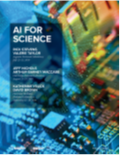
AI for Science
This report documents the DOE Town Halls held during 2019 at Argonne National Laboratory, Oak Ridge National Laboratory, Lawrence Berkeley National Laboratory, and in Washington, DC. From July to October 2019, the Argonne, Oak Ridge, and Berkeley National Laboratories hosted a series of four town hall meetings attended by more than 1,000 U.S. scientists and engineers. The goal of the town hall series was to examine scientific opportunities in the areas of artificial intelligence (AI), Big Data, and high-performance computing (HPC) in the next decade, and to capture the big ideas, grand challenges, and next steps to realizing these opportunities. In this report and in the Department of Energy (DOE) laboratory community, we use the term “AI for Science” to broadly represent the next generation of methods and scientific opportunities in computing, including the development and application of AI methods (e.g., machine learning, deep learning, statistical methods, data analytics, automated control, and related areas) to build models from data and to use these models alone or in conjunction with simulation and scalable computing to advance scientific research. The AI for Science town hall discussions focused on capturing the transformational uses of AI that employ HPC and/or data analysis, leveraging data sets from HPC simulations or instruments and user facilities, and addressing scientific challenges unique to DOE user facilities and the agency’s wide-ranging fundamental and applied science enterprise.
July, August, and September 2019: Report

Data and Models: A Framework for Advancing AI in Science
On June 5, 2019, the Office of Science (SC) organized a one-day roundtable to focus on enhancing access to high-quality and fully traceable research data, models, and computing resources to increase the value of such resources for artificial intelligence (AI) research and development and the SC mission.1 In this report, we consider AI to be inclusive of, for example, machine learning (ML), deep learning (DL), neural networks (NN), computer vision, and natural language processing (NLP). We consider “data for AI” to mean the digital artifacts used to generate AI models and/or employed in combination with AI models during inference. In part, this roundtable was motivated by the recognition that a large portion of science data currently are not well suited for AI.
June 2019: Report
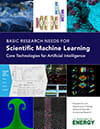
Basic Research Needs for Scientific Machine Learning: Core Technologies for Artificial Intelligence
Scientific Machine Learning (SciML) and Artificial Intelligence (AI) will have broad use and transformative effects across the Department of Energy. Accordingly, the ASCR January 2018 Basic Research Needs workshop report identifies six Priority Research Directions (PRDs) as viewed through the lens of applied mathematics and scientific computing. The six PRDs provide a sound basis for a coherent, long-term research and development strategy in SciML
February 2019: Brochure, Report
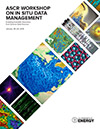
ASCR Workshop on In Situ Data Management: Enabling Scientific Discovery from Diverse Data Sources
In January 2019, ASCR convened a workshop on In Situ Data Management (ISDM). The goal was to identify priority research directions (PRDs) to support current and future scientific computing needs, which will increasingly incorporate a number of different tasks that need to be managed along with the main simulation or data analysis tasks. The workshop identified six PRDs that highlight the components and capabilities needed for ISDM to facilitate scientific discovery from a variety of different data sources.
January 2019: Brochure, Report

Basic Research Needs Workshop for Microelectronics
This report is based on a workshop on Basic Research Needs for Microelectronics, which was held October 23–25, 2018, and sponsored by ASCR, BES, and HEP. The goal of the workshop was to identify basic research needs associated with advanced microelectronics technologies for applications relevant to the DOE mission, including computing, power grid management, and science facility workloads.
October 2018: Brochure, Report
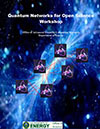
Quantum Networks for Open Science Workshop
DOE convened the Quantum Networks for Open Science (QNOS) Workshop in September 2018. The workshop was primarily focused on quantum networks optimized for scientific applications with the expectation that the resulting quantum networks could be extended to lay the groundwork for a generalized network that will evolve into a quantum internet (Q-Internet).
September 2018: Report

Storage Systems and I/O: Organizing, Storing, and Accessing Data for Scientific Discovery
In September, 2018, the Department of Energy, Office of Science, Advanced Scientific Computing Research Program convened a workshop to identify key challenges and define research directions that will advance the field of storage systems and I/O over the next 5–7 years. The workshop concluded that addressing these combined challenges and opportunities requires tools and techniques that greatly extend traditional approaches and require new research directions. Key research opportunities were identified.
September 2018: Report

Extreme Heterogeneity 2018: Productive Computational Science in the Era of Extreme Heterogeneity
In the 2025–2030 time frame, external economic drivers and design diversity will result in systems built from a custom aggregation of components; and the difficulty and complexity of developing scientific software will increase. This fundamental change in computer architecture design has been deemed the era of “extreme heterogeneity.”
The 2018 Basic Research Needs Workshop on Extreme Heterogeneity identified five Priority Research Directions for realizing the capabilities needed to address the challenges posed in this era of rapid technological change.
January 2018: Brochure, Report

ASCR Report on a Quantum Computing Testbed for Science
This report details the findings of the Quantum Testbed Stakeholder Workshop sponsored by the Department of Energy’s Advanced Scientific Computing Research Program to identify opportunities and challenges in establishing a quantum testbed to advance quantum computing hardware and software systems that will enable science investigations. The workshop was held on February 14 – 16, 2017 in Washington DC and served as a forum for individual stakeholders from academia, industry, national laboratories, and government to provide their perspectives and ideas on the overarching goals and objectives of a quantum testbed, technical considerations, and how a quantum testbed program would be synergistic with other nascent quantum computing efforts in the US and worldwide. This report summarizes discussions on best practices for management of various types of collaborative research activities, including topics such as workforce training and building strong relationships with the research community. It also reviews specific technologies that have been identified by the ASCR Program as being important for the success of a quantum testbed whose overall goal is advancing quantum computing for scientific applications in the next five years.
December 2017: Report.

Report of the HPC Correctness Summit
This report details the findings of the HPC Correctness Summit Workshop sponsored by the Department of Energy’s Advanced Scientific Computing Research Program to identify opportunities and challenges in High Performance Computing (HPC). The workshop was held on Jan 25 – 26, 2017, in Washington DC. Technologies for verification and debugging have made significant strides in the context of general systems software. An investment in such technologies to make them applicable for High Performance Computing (HPC) could lead to substantial improvements in the productivity and sustainability of HPC software development.
October 2017: Report.

Crosscut Report: Exascale Requirements Review Crosscut Report
During fiscal years (FYs) 2015 and 2016, the Exascale Requirements Reviews brought key computational domain scientists, U.S. Department of Energy (DOE) planners and administrators, and experts in computer science and applied mathematics together. Meetings were held for each of the DOE’s six Office of Science (SC) program offices. The results of the six reviews have been published in reports available on the web here and at http://exascaleage.org/. This report is based off the six reviews and a final crosscut review including all six program offices and held in early 2017. The report presents a summary of the individual reports and of common and crosscutting findingings, and it identifies opportunities for productive collaborations among the DOE SC program offices. See the Exascale Requirements Review (MainpageExternal link) for more information on this report (report.pdf file XMB) and information on the five other Exascale Requirements Reviews.
March 2017: Report.

2014 Runtime Systems Summit
This report summarized runtime system challenges for exascale computing, that follow from the fundamental challenges for exascale systems. Some of the key exascale challenges that pertain to runtime systems include parallelism, energy efficiency, memory hierarchies, data movement, heterogeneous processors and memories, resilience, performance variability, dynamic resource allocation, performance portability, and interoperability with legacy code. In addition to summarizing these challenges, the report also outlined different approaches to addressing these significant challenges that have been pursued by research projects in the DOE-sponsored X-Stack and OS/R programs. It also included a chapter on deployment opportunities for vendors and government labs to build on the research results from these projects.

Advanced Scientific Computing Research Exascale Requirements Review
During fiscal years (FYs) 2015 and 2016, the Exascale Requirements Reviews brought key computational domain scientists, U.S. Department of Energy (DOE) planners and administrators, and experts in computer science and applied mathematics together. Meetings were held for each of the DOE’s six Office of Science (SC) program offices.
For the ASCR Research Exascale Requirements Review, the available computing environment was decomposed into three tiers to clarify the differences in platform readiness and provide a common language to address the different types of systems and their associated needs.
September 2016: Report

Report of the 2014 Programming Models & Environments Summit
Programming models and environments play the essential roles in high performance computing of enabling the conception, design, implementation and execution of science and engineering application codes. This report presents the topics discussed and results from the 2014 DOE Office of Science Advanced Scientific Computing Research (ASCR) Programming Models & Environments Summit, and subsequent discussions among the summit participants and contributors to topics in this report.
September 2016: Report

Nuclear Physics Exascale Requirements Review
During fiscal years 2015 and 2016, the Exascale Requirements Reviews brought key computational domain scientists, U.S. Department of Energy (DOE) planners and administrators, and experts in computer science and applied mathematics together. Meetings were held for each of the DOE’s six Office of Science (SC) program offices. The results of the six reviews have been published in reports available at http://exascaleage.org/. DOE SC convened an Exascale Requirements Review for the NP program on June 15-17, 2016 in Gaithersburg, Maryland. The review brought together leading nuclear physics researchers and program managers, scientific and HPC experts from the ASCR facilities and scientific computing research areas, and DOE NP and ASCR staff.
June 2016: Report

Neuromorphic Computing: From Materials Research to Systems Architecture Roundtable
This workshop report describes basic research and development challenges and opportunities in the area of Neuromorphic Computing relevant to the U.S. Department of Energy (DOE) Advanced Scientific Computing Research (ASCR) program office. The focus of the workshop was to define a 10-20 year basic research and development roadmap for neuromorphic computing, a beyond-CMOS approach to future computing. The workshop was held during June 29 to July 1, 2016, at the Oak Ridge National Laboratory (ORNL) in Oak Ridge, TN.
October 2016: Report

Biological and Environmental Research Exascale Requirements Review
During fiscal years 2015 and 2016, the Exascale Requirements Reviews brought key computational domain scientists, U.S. Department of Energy (DOE) planners and administrators, and experts in computer science and applied mathematics together. Meetings were held for each of the DOE’s six Office of Science (SC) program offices. The results of the six reviews have been published in reports available at http://exascaleage.org/. DOE SC convened an Exascale Requirements Review for the Biological and Environmental Research (BER) division, which took place on March 28-31, 2016, in Rockville, Maryland, and brought together leading BER researchers and program managers, scientific and HPC experts from the ASCR facilities and scientific computing research areas, and DOE’s BER and ASCR staff and ESnet personnel.
March 2016: Report

STREAM2016: Streaming Requirements, Experience, Applications and Middleware Workshop
This report describes the discussions, outcomes, and conclusions from STREAM2016: Streaming Requirements, Experience, Applications and Middleware Workshop – the second workshop in the STREAM series, held on March 22-23, 2016 in Tysons, VA. STREAM2016 focused on DOE applications, computational and experimental facilities, as well as software systems. The role of streaming and steering as a critical aspect of the linkage between experimental and computing facilities was pervasive throughout the workshop. Given the overlap in interests and challenges faced by industry, the workshop had significant presence from several major companies in this area.
March 2016: Report

DOE Network 2025: Network Research Problems and Challenges for DOE Scientists Workshop
Guided by (1) a desire for an overall million-fold increase in bulk data transfer rates over the next decade and (2) a need to support a more complex and diverse mix of traffic flows over current and future networks, the DOE Network 2025 workshop, held in Bethesda, Maryland, February 1–2, 2016, articulated an integrated R&D portfolio to achieve these goals. The workshop identified short-, medium-, and long-term challenges to guide a robust network research program within the DOE Advanced Scientific Computing Research program. Integrated and agile protocols and related technologies must be developed and tailored to these science environments in the short- and medium-terms by leveraging current backbone capacities and their future enhancements to multiple 100 Gbps and Tbps rates. New capabilities and services need to be integrated into these networks to support complex and dynamic network traffic flows.
February 2016: Report

Fusion Energy Sciences Exascale Requirements Review
During fiscal years 2015 and 2016, the Exascale Requirements Reviews brought key computational domain scientists, U.S. Department of Energy (DOE) planners and administrators, and experts in computer science and applied mathematics together. Meetings were held for each of the DOE’s six Office of Science (SC) program offices. The results of the six reviews have been published in reports available at http://exascaleage.org/. DOE SC convened its programmatic Exascale Requirements Review for Fusion Energy Sciences on January 27-29, 2016, in Gaithersburg, Maryland. The review brought together nearly 100 participants to interact regarding areas of expertise, challenges faced, and possibilities for the future exascale computing environment. After DOE and ASCR presenters highlighted tasks to be accomplished (or at least initiated) during the review, a number of FES domain scientists highlighted FES science drivers, focusing on scientific goals to be pursued over the next decade and how exascale computing would play a role in reaching these goals..
January 2016: Report

Basic Energy Sciences Exascale Requirements Review
During fiscal years 2015 and 2016, the Exascale Requirements Reviews brought key computational domain scientists, U.S. Department of Energy (DOE) planners and administrators, and experts in computer science and applied mathematics together. Meetings were held for each of the DOE’s six Office of Science (SC) program offices. The results of the six reviews have been published in reports available at http://exascaleage.org/. The DOE SC Exascale Requirements Review for Basic Energy Sciences brought together key computational domain scientists and DOE planners and administrators to determine the requirements for an exascale ecosystem that includes computation, data analysis, software, workflows, HPC services, and the full range of computer requirements to support forefront scientific research in basic energy science through 2025.
November 2015: Report

Neuromorphic Computing: From Materials Research to Systems Architecture Roundtable
The Office of Science, through its Offices of Advanced Scientific Computing Research (ASCR) and Basic Energy Science (BES) convened a roundtable consisting of 20 national lab, university and industry experts to evaluate computing architectures that go beyond Moore's Law and mimic neuro-biological architectures. The focus was on both advanced materials and scientific computing research opportunities to support development of a new paradigm for extreme and self-reconfigurable computing architectures.

Report of the DOE Workshop on Management, Analysis and Visualization of Experimental and Observational Data: The Convergence of Data and Computing
The purpose of this workshop, held 29 September 2015 through 1 October 2015 in Bethesda, MD, is to help the Advanced Scientific Computing Research (ASCR) and research community better understand needs related to the management, analysis, and visualization of experimental and observational data (EOD) collected and generated by experimental and observational science projects (EOS) at Office of Science user facilities.

Turbulent Flow Simulation at the Exascale: Opportunities and Challenges Workshop
This workshop report describes challenges and opportunities that computing at the exascale will bring to turbulent-flow simulations in applied science and technology. The need for accurate simulation of turbulent flows is evident across the U.S. Department of Energy (DOE) applied-science and engineering portfolios, including combustion, plasma physics, nuclear-reactor physics, wind energy, and atmospheric science. The workshop was sponsored by the DOE Office of Advanced Scientific Computing Research and was held on August 4-5, 2015, at the Autograph Mayflower Hotel, Washington, D.C.
August 2015: Report

ASCR Cybersecurity for Scientific Computing Integrity: Research Pathways and Ideas Workshop
This workshop focused on three technological areas for understanding and improving cybersecurity namely: Trustworthy Supercomputing; Extreme Scale Data, Knowledge, and Analytics; and Trust within Open, High-End Networking and Data Centers.
June 2015: Report

ASCR Report on Quantum Computing for Science
This report details the findings of the DOE ASCR Workshop on Quantum Computing for Science that was organized to assess the viability of quantum computing technologies to meet the computational requirements of the DOE’s science and energy mission, and to identify the potential impact of quantum technologies.

High Energy Physics Exascale Requirements Review
During fiscal years 2015 and 2016, the Exascale Requirements Reviews brought key computational domain scientists, U.S. Department of Energy (DOE) planners and administrators, and experts in computer science and applied mathematics together. Meetings were held for each of the DOE’s six Office of Science (SC) program offices. The results of the six reviews have been published in reports available at http://exascaleage.org/. The DOE SC Exascale Requirements Review for High Energy Physics brought together key computational domain scientists, DOE planners and administrators, and experts in computer science and applied mathematics to determine the requirements for an exascale ecosystem that includes computation, data analysis, software, workflows, HPC services, and whatever else is needed to support forefront scientific research in high energy physics through 2025.
June 2015: Report

The Future of Scientific Workflows
The mission of this workshop was to develop requirements for workflow methods and tools in a
combined high-performance computing (HPC) and distributed-area instruments and computing
(DAIC) work environment, in order to enable science applications to better manage their end-to-end data flow.

Summary Report from 2015 Neuro-Inspired Computational Elements (NICE) Workshop
This workshop focused on Information Processing and Computation Systems beyond von Neumann/Turing Architecture and Moore’s Law Limits. The workshop brought together researchers from different scientific disciplines and applications areas to provide a nucleation point for the development of next generation of information processing/computation architectures that go beyond stored program architectures and Moore’s Law limits.

ASCR Cybersecurity for Scientific Computing Integrity
This workshop, focused on four technological areas: Extreme Scale Power Grid Simulation; Trustworthy Supercomputing; Trust within Open, High-End Networking and Data Centers; and Extreme Scale Data, Knowledge, and Analytics for Understanding and Improving Cyber Security.

Machine Learning and Understanding for Intelligent Extreme Scale Scientific Computing and Discovery
This workshop focused on three technological areas: self-aware runtime and operating systems; deep learning for big data; and resiliency and trust.

Storage Systems and Input/Output to Support Extreme Scale Science: Report of the DOE Workshops on Storage Systems and Input/Output
Four priority research directions emerged from this activity: (1) In the area of SSIO architectures, additional research is needed to develop solutions to the challenge of managing upcoming deep and heterogeneous storage hierarchies, including storage in the computer system, and to explore alternative paradigms to the current file system model of access and organization; (2) In the area of metadata, name spaces, and provenance, research is needed to devise new methods of capturing, organizing, presenting, and exploring rich metadata from DOE science activities, including breaking away from the current file model of data storage prevalent in DOE supercomputing facilities and science; (3) In the area of supporting science data, research is needed to develop the next generation of I/O middleware and services in support of the broad collection of HPC and experimental and observational data needs and to integrate with and support new programming abstractions and workflow systems as they are adopted; and (4) In the area of understanding SSIO, research is needed to improve our ability to characterize the storage activities of DOE scientists and to model and predict the behavior of SSIO activities on future systems.

Report of Workshop on Modeling & Simulation of Systems and Applications
ModSim 2014, focused on three critical technological areas: (1) Integrated Modeling and Simulation of Performance, Power, and Reliability; (2) Standards, Integration, and Interoperability of ModSim Methodologies and Tools; and Advances in Core Modeling and Simulation Methods and Tools.

Applied Mathematics Research for Exascale Computing
This report details the findings and recommendations of the DOE ASCR Exascale Mathematics Working Group that was chartered to identify mathematics and algorithms research opportunities that will enable scientific applications to harness the potential of exascale computing. The working group organized a workshop, held August 21-22, 2013 in Washington, D.C., to solicit input from over seventy members of the applied mathematics community. Research gaps, approaches, and directions across the breadth of applied mathematics were discussed, and this report synthesizes these perspectives into an integrated outlook on the applied mathematics research necessary to achieve scientific breakthroughs using exascale systems.

Software Productivity for Extreme-Scale Science
This report presents results from the DOE workshop on Software Productivity for eXtreme-scale Science (SWP4XS) held January 13-14, 2014, in Rockville, MD. The workshop brought together approximately fifty experts in the development of large-scale scientific applications, numerical libraries, and computer science infrastructure to determine how to address the growing crisis in software productivity caused by disruptive changes in extreme-scale computer architectures.




